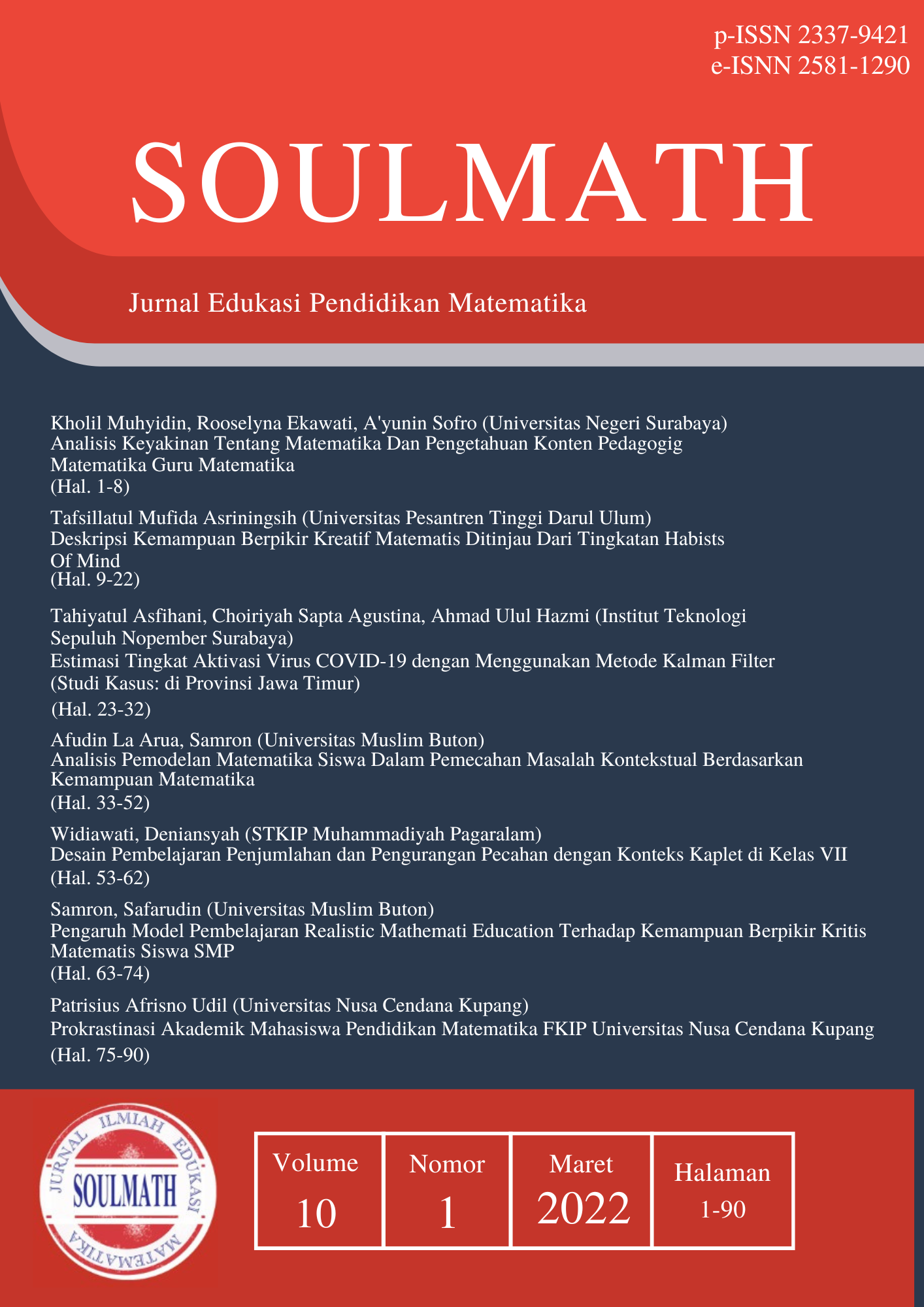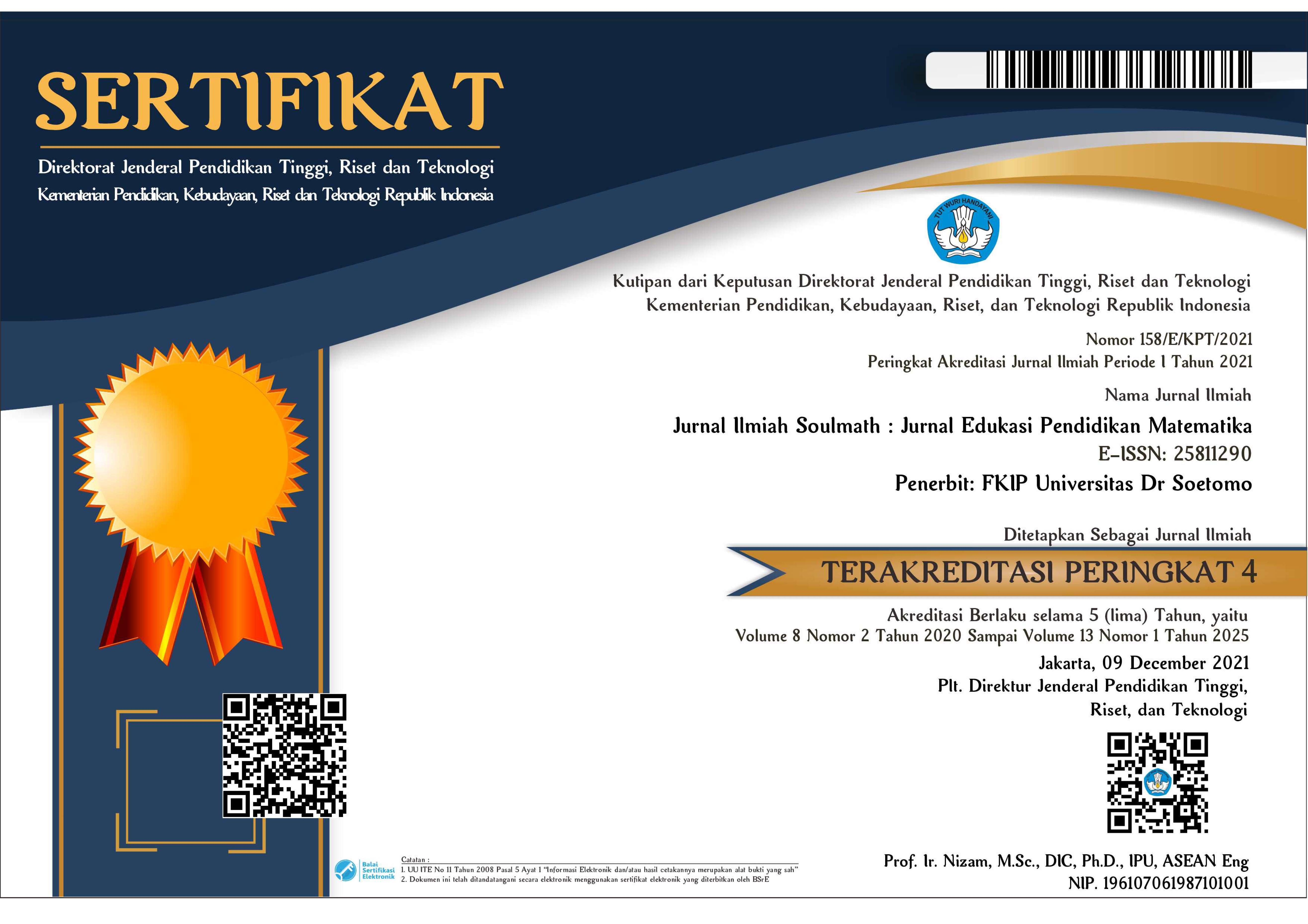Pengaruh Model Pembelajaran Realistic Mathematic Education Terhadap Kemampuan Berpikir Kritis Matematis Siswa SMP
 Abstract views: 303
,
Abstract views: 303
,
 4385 publish (Bahasa Indonesia) downloads: 229
4385 publish (Bahasa Indonesia) downloads: 229
Abstract
Entering the life of the industrial revolution 4.0, high-level abilities must be possessed by every student including the ability to think critically in mathematics. Developing and improving students' mathematical critical thinking skills requires a learning model that can provide flexibility for students to develop ideas by relating students' real lives. The learning model that relates the real life of students in the learning process is the realistic mathematics education learning model. The purpose of this study was to determine the effect of the realistic mathematics education learning model on the mathematical critical thinking skills of junior high school students. This type of research is a quasi-experimental research with a pretest-posttest control group design in class VIII SMP Negeri 9 Baubau as many as 2 classes consisting of 1 experimental class and 1 control class. Sampling using purposive sampling technique. Data were analyzed using t-test analysis. The results showed: (1) the realistic mathematics education learning model had an effect on increasing students' mathematical critical thinking skills; (2) the realistic mathematics education learning model has a better effect than conventional learning models on increasing the mathematical critical thinking skills of junior high school students.
Downloads
References
S. M. Jacob, “Mathematical achievement and critical thinking skills in asynchronous discussion forums,” Procedia - Soc. Behav. Sci., vol. 31, no. 2011, pp. 800–804, 2012, doi: 10.1016/j.sbspro.2011.12.144.
Ebiendele Ebosele Peter, “Critical thinking: Essence for teaching mathematics and mathematics problem solving skills,” African J. Math. Comput. Sci. Res., vol. 5, no. 3, pp. 39–43, 2012, doi: 10.5897/ajmcsr11.161.
H. Reeder, “The Nature of Critical Thinking: An Outline of Critical Thinking Disposition and Abilities,” Informal Log., vol. 6, no. 2, pp. 1–8, 1984, doi: 10.22329/il.v6i2.2729.
Husnaeni, “Peningkatan Profesionalisme Guru Di Era Digital Melalui Kemampuan Berpikir Kritis Matematis Siswa Dengan Model Pembelajaran Interaktif Setting Kooperatif (PISK),” Pros. Temu Ilm. Nas. Guru VIII, no. November, pp. 265–275, 2016, [Online]. Available: https://repository.ut.ac.id/6500/1/TING2016ST1-26.pdf
R. K. Sembiring, “PENDIDIKAN MATEMATIKA REALISTIK INDONESIA (PMRI): PERKEMBANGAN dan TANTANGANNYA,” IndoMS. J.M.E, vol. 1, no. 1, pp. 11–16, 2010.
I. Junaedi, M. Asikin, and M. Masrukan, “Penerapan Realistic Mathematics Education (RME) dengan Konteks Karakter dan Konservasi untuk Meningkatkan Kemampuan Mahasiswa dalam Menyusun Proposal Penelitian,” Kreano, J. Mat. Kreat., vol. 6, no. 2, p. 177, 2015, doi: 10.15294/kreano.v6i2.4988.
L. Zhafirah, “Penerapan Model Pembelajaran Realistic Mathematics Education (RME) Untuk Meningkatkan Hasil Belajar Matematika Siswa Kelas V SDN 166 Laburawung Kecamatan Lalabata Kabupaten Soppeng,” Univ. Negeri Makassar, pp. 1–11, 2020.
D. Herawaty, “Model pembelajaran matematika realistik yang efektif untuk meningkatkan kemampuan matematika siswa SMP,” J. Pendidik. Mat. Raflesia, vol. 3, no. 2, pp. 107–125, 2018.
D. Kurniawati and A. Ekayanti, “Pentingnya Berpikir Kritis Dalam Pembelajaran Matematika,” PeTeKa (Jurnal Penelit. Tindakan Kelas dan Pengemb. Pembelajaran), vol. 3, no. 2, pp. 107–114, 2020, [Online]. Available: http://jurnal.um-tapsel.ac.id/index.php/ptk/article/view/1892
R. Oktaviani, H. Harman, and S. Dewi, “Pengaruh Pendekatan Realistic Mathematics Education (Rme) Terhadap Kemampuan Berpikir Kritis Siswa Kelas Vii Smp Negeri 2 Kota Jambi,” PHI J. Pendidik. Mat., vol. 2, no. 1, p. 40, 2018, doi: 10.33087/phi.v2i1.25.
I. Trimahesri, A. Tyas, and A. Hardini, “Peningkatan Kemampuan Berpikir Kritis dan Hasil Belajar Pada Mata Pelajaran Matematika Menggunakan Model Realistic Mathematics Education,” Think. Ski. Creavity J., vol. 2, no. 2, pp. 111–120, 2019.
Sugiyono, Metode Penelitian Pendidika: Pendekatan Kuantitatif, Kualitatif, Cet 21. Bandung, 2015.
E. Susilowati, “Peningkatan Aktivitas dan Hasil Belajar Matematika Siswa SD Melalui Model Realistic Mathematic Education (RME) Pada Siswa Kelas IV Semester I di SD Negeri 4 Kradenan Kecamatan Kradenan Kabupaten Grobongan Tahun Pelajaran 2017/2018,” vol. 4, no. 1, 2018.
S. Ningsih, “Realistic Mathematics Education: Model Alternatif Pembelajaran Matematika Sekolah,” J. Pendidik. Mat., vol. 1, no. 2, p. 73, 2014, doi: 10.18592/jpm.v1i2.97.
A. Kurnia Asih, E. Bambang Irawan, and C. Sa, “Penerapan realistic mathematics education untuk meningkatkan kemampuan berpikir kritis siswa kelas V,” J. Pendidik. Teor. Penelitian, dan Pengemb., vol. 2, no. 4, pp. 524–530, 2017, [Online]. Available: http://journal.um.ac.id/index.php/jptpp/







